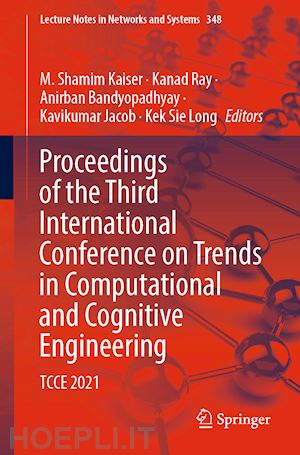
Questo prodotto usufruisce delle SPEDIZIONI GRATIS
selezionando l'opzione Corriere Veloce in fase di ordine.
Pagabile anche con Carta della cultura giovani e del merito, 18App Bonus Cultura e Carta del Docente
This book presents various computational and cognitive modeling approaches in the areas of health, education, finance, environment, engineering, commerce, and industry. It is a collection of selected conference papers presented at the 3rd International Conference on Trends in Cognitive Computation Engineering (TCCE 2021), hosted online by Universiti Tun Hussein Onn Malaysia (UTHM) during October 21–22, 2021. It shares cutting-edge insights and ideas from mathematicians, engineers, scientists, and researchers and discusses fresh perspectives on problem solving in a range of research areas.
Dr. M Shamim Kaiser is currently working as Professor at the Institute of Information Technology of Jahangirnagar University, Savar, Dhaka-1342, Bangladesh. He received his Bachelor's and Master's degrees in Applied Physics Electronics and Communication Engineering from the University of Dhaka, Bangladesh, in 2002 and 2004, respectively, and the Ph.D. degree in Telecommunication Engineering from the Asian Institute of Technology, Thailand, in 2010. His current research interests include data analytics, machine learning, wireless network and signal processing, cognitive radio network, big data and cyber security, renewable energy. He has authored more than 100 papers in different peer-reviewed journals and conferences. He is Associate Editor of the IEEE Access Journal, Guest Editor of Brain Informatics Journal, and Cognitive Computation Journal. He is Life Member of Bangladesh Electronic Society; Bangladesh Physical Society. He is also a senior member of IEEE, USA, and IEICE, Japan,and active volunteer of the IEEE Bangladesh Section. He is founding Chapter Chair of the IEEE Bangladesh Section Computer Society Chapter. He organized various international conferences such as ICEEICT 2015-2018, IEEE HTC 2017, IEEE ICREST 2018, and BI2020.
Kanad Ray (Senior Member, IEEE) received the M.Sc. degree in physics from Calcutta University and the Ph.D. degree in physics from Jadavpur University, West Bengal, India. He has been Professor of Physics and Electronics and Communication and is presently working as Head of the Department of Physics, Amity School of Applied Sciences, Amity University Rajasthan (AUR), Jaipur, India. His current research areas of interest include cognition, communication, electromagnetic field theory, antenna and wave propagation, microwave, computational biology, and applied physics. He has been serving as Editor for various Springer book series. He was Associate Editor of the Journal of Integrative Neuroscience (The Netherlands: IOS Press). He has been visiting Professor to UTM & UTeM, Malyasia and visiting Scientist to NIMS, Japan. He has established MOU with UTeM Malaysia, NIMS Japan, and University of Montreal, Canada. He has visited several countries such as Netherlands, Turkey, China, Czechoslovakia, Russia, Portugal, Finland, Belgium, South Africa, Japan, Singapore, Thailand,and Malaysia for various academic missions. He has organized various conferences such as SoCPROS, SoCTA, ICOEVCI, and TCCE as General Chair and Steering Committee Member.
Anirban Bandyopadhyay is Senior Scientist in the National Institute for Materials Science (NIMS), Tsukuba, Japan. He possesses a Masters of Science in Condensed Matter Physics, Computer, Numerical Analysis, and Astrophysics from North Bengal University and Doctor of Philosophy in Physics from Jadavpur University. He received his Ph.D. from the Indian Association for the Cultivation of Science (IACS), Kolkata. 2004–2005, where he worked on supramolecular electronics and multi-level switching. He has developed a resonance chain based complete human brain model that is fundamentally different than Turing tape essentially developing an alternate human brain map where filling gaps in the resonance chain is the key. He has developed unique a quantum music measurement machine and experiments on DNA proteins, microtubules, neurons, molecular machines, cancer. He has also developed a new frequency fractal model. His group has designed and synthesized several forms of organic brain jelly that learns, programs and solves problems by itself for futuristic robots during as well as several software simulators that write complex codes by themselves.
Dr. Kavikumar Jacob has been Associate Professor in the Faculty of Applied Sciences and Technology at Universiti Tun Hussein Onn Malaysia since 2006. In 2005, he obtained his doctor’s degree from Annamalai University, India. He has published more than 50 research papers including the International Journal of Fuzzy System, Physica A: Statistical Mechanics and its Applications, and the Iranian Journal of Fuzzy Systems. Most of the publications are listed on the Scopus page. His research interests are control theory, automata theory, fuzzy mathematics, and numerical analysis.
Sie Long Kek is currently working as a senior lecturer in the Department of Mathematics and Statistics, Faculty of Applied Sciences and Technology, Universiti Tun Hussein Onn Malaysia. He received his M.Sc. and Ph.D. in Mathematics from Universiti Teknologi Malaysia, Johor, Malaysia, in 2002 and 2011, respectively. He was a research associate at the Curtin University of Technology in 2009 during his Ph.D. study. His research interests include optimization and control, operation research and management science, modeling and simulation, parameter estimation, Kalman filtering, and computational mathematics. H











Il sito utilizza cookie ed altri strumenti di tracciamento che raccolgono informazioni dal dispositivo dell’utente. Oltre ai cookie tecnici ed analitici aggregati, strettamente necessari per il funzionamento di questo sito web, previo consenso dell’utente possono essere installati cookie di profilazione e marketing e cookie dei social media. Cliccando su “Accetto tutti i cookie” saranno attivate tutte le categorie di cookie. Per accettare solo deterninate categorie di cookie, cliccare invece su “Impostazioni cookie”. Chiudendo il banner o continuando a navigare saranno installati solo cookie tecnici. Per maggiori dettagli, consultare la Cookie Policy.